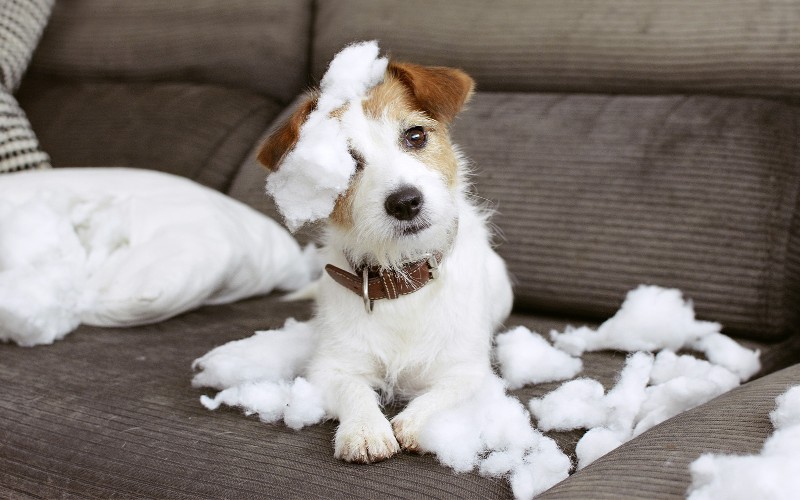
ՊԱՅՔԱՐՈՒՄ ԵՆՔ ՇԱՆ ԱՆՀԱՆԳՍՏՈՒԹՅԱՆ ԴԵՄ։ ՇՈՒՆԻԿԻ ԲԱՐՕՐՈՒԹՅՈՒՆՆ ՈՒ ԵՐՋԱՆԿՈՒԹՅՈՒՆԸ ԱՆԽԱԽՏ ՊԱՀԵԼՈՒ ՀԱՄԱՐ
Շները, որոնք հայտնի են որպես մարդու բարեկամ, շատ զգայուն արարածներ են և կարող են մարդկանց նման ունենալ անհանգստության զգացողություն։ Անկախ նրանից, թե դա վախ է բաժանումից, աղմուկից կամ ընդհանուր նյարդայնությունից, ձեր փամփլիկի անհանգստությունը գիտակցելը և վերացնելը կարևոր է նրա բարեկեցության և ձեր մտքի խաղաղության համար:Քանի որ անհանգստությունը, ինչպես նաև այլ հուզական խանգարումներ, ինչպիսիք են բաժանման անհանգստությունը կամ վախի վրա հիմնված վարքագիծը, կարող են էական ազդեցություն ունենալ ընտանի կենդանիների վրա, Մենք խստորեն խորհուրդ ենք տալիս դիմել մասնագետի օգնությանը։ Խստորեն խորհուրդ է տրվում խորհրդակցել կենդանիների վարքի փորձագետի կամ շների հավաստագրված վարժեցնողի հետ: Այս մասնագետներն ունեն փորձ և վերապատրաստում, որոնք անհրաժեշտ են ինչպես ձեր, այնպես էլ ձեր ընտանի կենդանու հատուկ կարիքները գնահատելու համար և խորհուրդ են տալիս անհատականացված ռազմավարություններ ՝ անհանգստությունը արդյունավետ կառավարելու համար:
Բարեբախտաբար կան շատ միջոցառումներ, որոնք կարելի է ձեռնարկել, որպեսզի Ձեր շունն իրեն ավելի հանգիստ և երջանիկ զգա։
ՀԱՍԿԱՆԱԼ ԱՆՀԱՆԳՍՏՈՒԹՅԱՆ ՊԱՏՃԱՌԸ
Մինչ խորհուրդնել տալը, հարկավո է հասկանալ շան անհանգստության պատճառները։
We can separate the causes into those we can actively address such as separation from their owners or being in unfamiliar environments, and sudden triggers over which we have no control over such as loud noises like thunderstorms or fireworks. Dogs can exhibit anxiety through behaviors such as excessive barking, panting, pacing, trembling, destructive chewing, or even aggression. At the end of the day, you know your pup best. Stay observant and be their advocate!
TIPS FOR MANAGING DOG ANXIETY
Establish a routine: Dogs thrive on routine and predictability. Establishing a consistent daily schedule for feeding, walks, and playtime can provide a sense of stability, reducing anxiety levels.
Provide physical and mental stimulation: Regular exercise is vital for a dog's physical and mental well-being. Engage your pup in activities like walks, interactive toys, or obedience training to keep their minds occupied and reduce stress.
Create a safe space: Designate a quiet, comfortable area in your home where your dog can retreat when feeling anxious. Whether it's a cozy corner with a bed or a crate covered with a blanket, having a safe space can offer your pup a sense of security.
Gradual desensitization: For dogs with specific phobias or anxieties and that belong to the sudden triggers category such as fear of thunderstorms or car rides, desensitization techniques can be effective. Gradually expose your dog to the trigger in a controlled setting while providing positive reinforcement, gradually increasing exposure over time.
Relaxing techniques: To help him cope with stressful situations, try distracting him by giving him commands which he is most likely to fulfil and reward him upon correct execution. Also spending quality time together in a calm environment can also promote bonding and reduce anxiety.
Avoid punishment: Punishment is not an effective way to address dog anxiety and can worsen the problem. Instead, focus on positive reinforcement techniques, rewarding calm behavior with treats, praise, or playtime.
Pay attention to nutrition: Even though not a direct cause, nutrition related issues such as sudden change in diet, nutritional deficiencies, intolerance or allergies, may exacerbate the symptoms. The health of the gut can influence a dog's mood and behavior. A happy, healthy gut can contribute to a happier, calmer dog. On the other hand, an upset gut might lead to symptoms including anxiety or stress.
Use calming products: Various products, such as calming pheromone diffusers, compression vests, or herbal supplements, are available to help alleviate dog anxiety. Consult with your veterinarian to determine the most suitable options for your furry friend.
Improving the well-being and quality of your pet's life
Dealing with dog anxiety requires patience, understanding, and a proactive approach. By implementing these tips and techniques, you can help your furry companion feel calmer, happier, and more secure in various situations. Remember, every dog is unique, so it may take time to find the right combination of strategies that work best for your four-legged friend. With love, consistency, and proper care, you can make a significant difference in your dog's overall well-being and quality of life.
